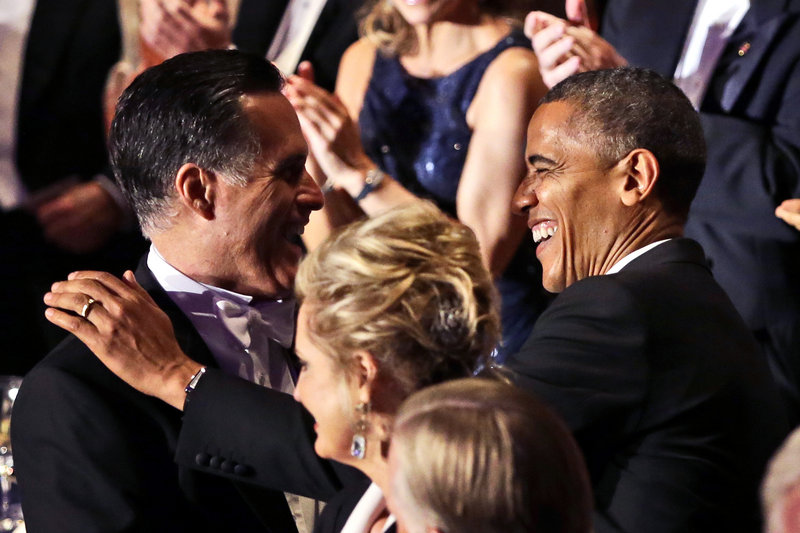WASHINGTON – On the eve of their final presidential debate, Mitt Romney and Barack Obama — through their allies — squared off Sunday over which candidate would best protect the nation’s interests and security abroad, with just two weeks left in a race that polls show is increasingly tight.
Both candidates stayed largely out of view, preparing vigorously for their Monday faceoff focused on foreign policy.
Republicans accused Obama of leaking word of possible negotiations with Iran in pursuit of political gain. Democrats shot back, arguing that Romney and his party are the ones playing politics with national security.
LOCKING IN SUPPORTERS
The haggling played out on Sunday news shows at a critical time for Romney and Obama, whose race has become exceedingly close as it lurches toward its November conclusion. Early and absentee voting is already under way in many of the most competitive states, upping the pressure on both candidates to lock in supporters.
Two weeks out, the race appears to be tied, with both candidates taking 47 percent among likely voters in a Wall Street Journal/NBC News poll released Sunday that reflected a boost of support for Romney following his lauded performance in the first debate in early October.
Romney’s top supporters launched sweeping condemnations of Obama’s handling of foreign policy, assailing him over a deadly attack on the U.S. Consulate in Benghazi, Libya, and arguing that under the president’s negligent watch, Iran has crept closer to obtaining a nuclear weapon.
Republican Sen. Rob Portman of Ohio, who played Obama in Romney’s debate preparations, said a new report claiming the United States and Iran had agreed to direct negotiations seemed like “another example of a national security leak from the White House.”
“They’ve done a lot of that,” Portman said, alluding to accusations over the summer that Obama’s administration was leaking information to bolster his political prospects ahead of the election. He was echoed by Sen. Lindsey Graham, R-S.C., who called the timing of the report “pretty obvious.”
The White House said Saturday that while it is prepared for direct talks with Iran, there’s no current agreement to meet. On Sunday, Obama’s backers credited him for isolating Iran within the global community and adopting effective sanctions that have crippled the Persian Gulf nation.
‘INTERNATIONAL COALITION’
“For two years, the president traveled the world putting together a withering international coalition. And now the sanctions that they agreed on are bringing the Iranian economy to its knees,” said David Axelrod, a senior Obama adviser. “They’re feeling the heat. And that’s what the sanctions were meant to do.”
Romney, taking a break from debate prep Sunday in Delray Beach, Fla., declined to answer a reporter’s question about whether he would be open to one-on-one talks with Iran.
Still, Obama’s allies were wedged into a defensive posture as Republicans undertook an everything-but-the-kitchen-sink approach to deflating Obama’s foreign policy record.
Graham said the Libya attack reflected “one of the most major breakdowns of national security in a very long time.” Sen. Marco Rubio, R-Fla., in a clear nod to Cuban-American voters in his battleground state, even suggested that Obama’s loosening of travel restrictions to Cuba had provided a source of cash for the Castro regime and undermined political freedoms.
Democrats were ready with indictments of their own. Chicago Mayor Rahm Emanuel said the House Republicans’ release Friday of 166 pages of Libya-related documents had put lives in danger.
“People around the world will now know that you’re at risk if you cooperate with the United States,” said Emanuel, Obama’s former chief of staff.
Romney’s supporters waxed optimistic that the race is trending in the Republican’s direction, even in crucial states like Ohio that Obama won four years ago and where unemployment is on the decline. Portman said he’s traversed his home state over the past two weeks on behalf of Romney and likes what he’s seeing on the ground.
“The enthusiasm energy is on our side this year. I mean, it’s not like 2008 at all,” he said.
Both candidates dedicated their weekend to intensive study for the debate; Obama huddled with advisers in Maryland and Romney with his team in Florida.
On the agenda were Iran-Israel tensions, China, terrorism and the war in Afghanistan — all subjects expected to come up Monday in the 90-minute encounter moderated by CBS News’ Bob Schieffer. Although polls show the economy is of top concern to most voters, global affairs have cropped up as a key issue in the final weeks due to unrest in Libya, Syria and elsewhere.
Send questions/comments to the editors.



Comments are no longer available on this story